外企面试常用英文词汇
外企hr经常说的英语
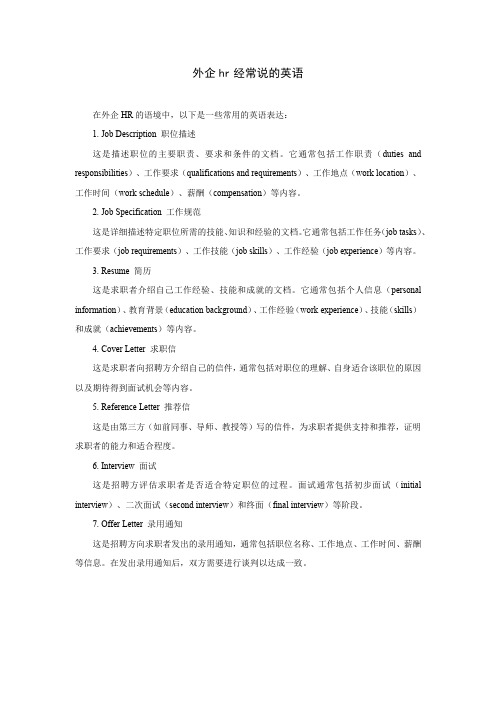
外企hr经常说的英语在外企HR的语境中,以下是一些常用的英语表达:1. Job Description 职位描述这是描述职位的主要职责、要求和条件的文档。
它通常包括工作职责(duties and responsibilities)、工作要求(qualifications and requirements)、工作地点(work location)、工作时间(work schedule)、薪酬(compensation)等内容。
2. Job Specification 工作规范这是详细描述特定职位所需的技能、知识和经验的文档。
它通常包括工作任务(job tasks)、工作要求(job requirements)、工作技能(job skills)、工作经验(job experience)等内容。
3. Resume 简历这是求职者介绍自己工作经验、技能和成就的文档。
它通常包括个人信息(personal information)、教育背景(education background)、工作经验(work experience)、技能(skills)和成就(achievements)等内容。
4. Cover Letter 求职信这是求职者向招聘方介绍自己的信件,通常包括对职位的理解、自身适合该职位的原因以及期待得到面试机会等内容。
5. Reference Letter 推荐信这是由第三方(如前同事、导师、教授等)写的信件,为求职者提供支持和推荐,证明求职者的能力和适合程度。
6. Interview 面试这是招聘方评估求职者是否适合特定职位的过程。
面试通常包括初步面试(initial interview)、二次面试(second interview)和终面(final interview)等阶段。
7. Offer Letter 录用通知这是招聘方向求职者发出的录用通知,通常包括职位名称、工作地点、工作时间、薪酬等信息。
外企必背词汇
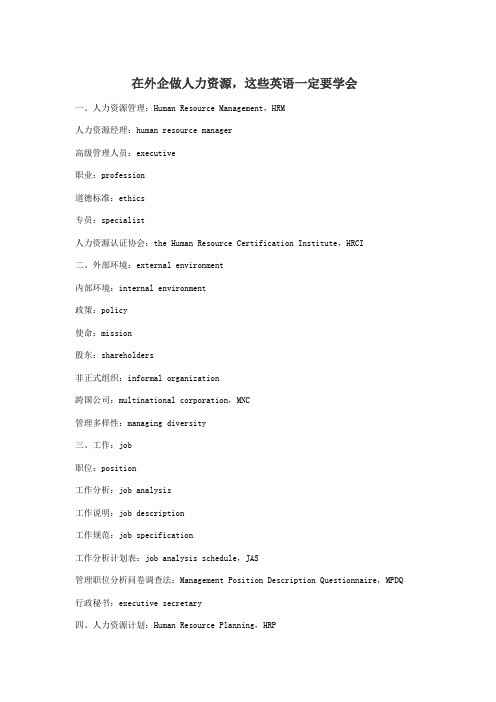
在外企做人力资源,这些英语一定要学会一、人力资源管理:Human Resource Management,HRM人力资源经理:human resource manager高级管理人员:executive职业:profession道德标准:ethics专员:specialist人力资源认证协会:the Human Resource Certification Institute,HRCI二、外部环境:external environment内部环境:internal environment政策:policy使命:mission股东:shareholders非正式组织:informal organization跨国公司:multinational corporation,MNC管理多样性:managing diversity三、工作:job职位:position工作分析:job analysis工作说明:job description工作规范:job specification工作分析计划表:job analysis schedule,JAS管理职位分析问卷调查法:Management Position Description Questionnaire,MPDQ 行政秘书:executive secretary四、人力资源计划:Human Resource Planning,HRP战略规划:strategic planning长期趋势:long term trend需求预测:demand forecast供给预测:availability forecast管理人力储备:management inventory裁员:downsizing人力资源信息系统:Human Resource Information System,HRIS 五、招聘:recruitment员工需求申请表:employee requisition招聘方法:recruitment methods内部提升:Promotion From Within,PFW职位公告:job posting广告:advertising职业介绍所:employment agency特殊事件:special events实习:internship六、选择:selection选择率:selection rate简历:resume标准化:standardization有效性:validity客观性:objectivity规范:norm录用分数线:cutoff score准确度:aiming业务知识测试:job knowledge tests求职面试:employment interview非结构化面试:unstructured interview结构化面试:structured interview小组面试:group interview职业兴趣测试:vocational interest tests会议型面试:board interview七、组织变化与人力资源开发人力资源开发:Human Resource Development,HRD 培训:training开发:development新员工培训:orientation训练:coaching辅导:mentoring经营管理策略:business games案例研究:case study会议方法:conference method角色扮演:role playing工作轮换:job rotating在职培训:on-the-job training,OJT媒介:media八、企业文化与组织发展企业文化:corporate culture组织发展:organization development,OD调查反馈:survey feedback质量圈:quality circles目标管理:management by objective,MBO全面质量管理:Total Quality Management,TQM 团队建设:team building九、职业计划与发展职业:career职业计划:career planning职业道路:career path职业发展:career development自我评价:self-assessment职业定位:career anchors十、绩效评价绩效评价:Performance Appraisal,PA小组评价:group appraisal业绩评定表:rating scales method关键事件法:critical incident method排列法:ranking method平行比较法:paired comparison硬性分布法:forced distribution method晕圈错误:halo error宽松:leniency严格:strictness360反馈:360-degree feedback叙述法:essay method集中趋势:central tendency十一、报酬与福利报酬与福利:compensation and benefits直接经济报酬:direct financial compensation间接经济报酬:indirect financial compensation非经济报酬:non-financial compensation公平:equity外部公平:external equity内部公平:internal equity员工公平:employee equity小组公平:team equity工资水平领先者:pay leaders现行工资率:going rate工资水平居后者:pay followers劳动力市场:labor market工作评价:job evaluation排列法:ranking method分类法:classification method因素比较法:factor comparison method评分法:point method海氏指示图表个人能力分析法:Hay Guide Chart-profile Method 工作定价:job pricing工资等级:pay grade工资曲线:wage curve工资幅度:pay range十二、福利和其它报酬问题员工股权计划:employee stock ownership plan,ESOP 交通补助:travel allowance奖金:bonus分红制:profit sharing十三、安全与健康的工作环境安全:safety健康:health频率:frequency rate紧张:stress角色冲突:role conflict催眠法:hypnosis酗酒:alcoholism十四、员工和劳动关系工会:union地方工会:local union行业工会:craft union产业工会:industrial union全国工会:national union谈判组:bargaining union集体协定:collective bargaining仲裁:arbitration罢工:strike内部员工关系:internal employee relations纪律:discipline纪律处分:disciplinary action降职:demotion调动:transfer晋升:promotion外企生存十大必备英语单词1、Performance (n.)人业绩、表现His performance this month has been less than sat isfactory.他这个月的业绩不是很令人满意。
外企常用词汇及表达[解说]
![外企常用词汇及表达[解说]](https://img.taocdn.com/s3/m/31b45d47ac02de80d4d8d15abe23482fb5da0244.png)
外企常用词汇及表达1. RGDS: Regards2. TKS: Thanks3. ASAP: As soon as possible 越快越好4. BTW: By the way 顺便说一下5. FW: Forward6. COD: Code of conduct 公司行为规范准则7. EG: For example8. FYI: For you information 意思是不关你的事,你看一下就好了9. ETC: Estimated time of complete 预计完成时间10. ETS: Estimated time of shipping 预计船期11. NG: No good 不合格12. CC: Carbon copy 抄送13. Stand up meeting 非正式的短会,比如说三两个人站在过道中间讨论一下事情,老外喜欢这样干;14. Conference Call 电话会议15. Aggressive 这是领导表扬和批评人用的:“小×,你最近可是很不aggressive啊!”于是,俺是每天很aggressive地上班,很aggressive地下班。
16. Add Sb To loop 这就是说要把谁给绕到圈子里去,有的事知道的人少,这就很不好,应该让多些人知道,于是就把他绕到圈子里去。
17. Involve 跟上面的意思一样,就是上面的是邮件里面说的,这个是用话说的。
需要谁来搀和一下了,就把谁给involve进来。
18. Broadcast 这是外企发通知用的,比如“嘿,听说了吗?broadcast说了,食堂要涨价了,原来6块,现在6块6了!”19. Team 这是公司里每一个小队,比如开会时别的部门的领导问:“你是哪个team的?”我就回答说:“我是XX小队长那个team的呀。
”20. Push 做工作嘛,困难大了就要推呀,反正这工作来了,就得推这个,推那个,一个推一个。
外企日常工作中常用地英语术语和缩写
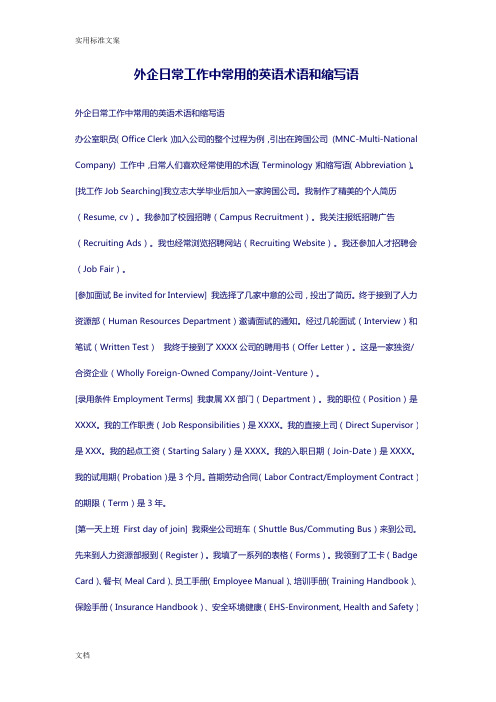
外企日常工作中常用的英语术语和缩写语外企日常工作中常用的英语术语和缩写语办公室职员(Office Clerk)加入公司的整个过程为例,引出在跨国公司(MNC-Multi-National Company) 工作中,日常人们喜欢经常使用的术语(Terminology)和缩写语(Abbreviation)。
[找工作Job Searching]我立志大学毕业后加入一家跨国公司。
我制作了精美的个人简历(Resume, cv)。
我参加了校园招聘(Campus Recruitment)。
我关注报纸招聘广告(Recruiting Ads)。
我也经常浏览招聘网站(Recruiting Website)。
我还参加人才招聘会(Job Fair)。
[参加面试Be invited for Interview] 我选择了几家中意的公司,投出了简历。
终于接到了人力资源部(Human Resources Department)邀请面试的通知。
经过几轮面试(Interview)和笔试(Written Test)我终于接到了XXXX公司的聘用书(Offer Letter)。
这是一家独资/合资企业(Wholly Foreign-Owned Company/Joint-Venture)。
[录用条件Employment Terms] 我隶属XX部门(Department)。
我的职位(Position)是XXXX。
我的工作职责(Job Responsibilities)是XXXX。
我的直接上司(Direct Supervisor)是XXX。
我的起点工资(Starting Salary)是XXXX。
我的入职日期(Join-Date)是XXXX。
我的试用期(Probation)是3个月。
首期劳动合同(Labor Contract/Employment Contract)的期限(Term)是3年。
[第一天上班First day of join] 我乘坐公司班车(Shuttle Bus/Commuting Bus)来到公司。
外企面试常用语
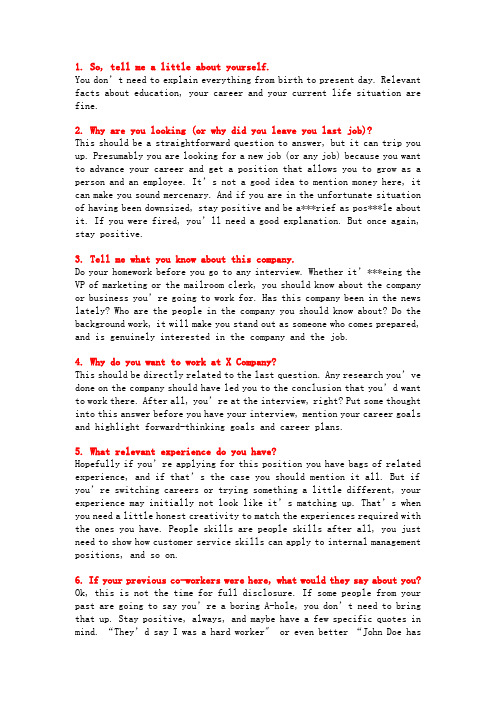
1. So, tell me a little about yourself.You don’t need to explain everything from birth to present day. Relevant facts about education, your career and your current life situation are fine.2. Why are you looking (or why did you leave you last job)?This should be a straightforward question to answer, but it can trip you up. Presumably you are looking for a new job (or any job) because you want to advance your career and get a position that allows you to grow as a person and an employee. It’s not a good ide a to mention money here, it can make you sound mercenary. And if you are in the unfortunate situation of having been downsized, stay positive and be a***rief as pos***le about it. If you were fired, you’ll need a good explanation. But once again, stay positive.3. Tell me what you know about this company.Do your homework before you go to any interview. Whether it’***eing the VP of marketing or the mailroom clerk, you should know about the company or business you’re going to work for. Has this company been in the news lately? Who are the people in the company you should know about? Do the background work, it will make you stand out as someone who comes prepared, and is genuinely interested in the company and the job.4. Why do you want to work at X Company?This should be directly related to the last question. Any research you’ve done on the company should have led you to the conclusion that you’d want to work there. After all, you’re at the interview, right? Put some thought into this answer before you have your interview, mention your career goals and highlight forward-thinking goals and career plans.5. What relevant experience do you have?Hopefully if you’re applying for this position you have bags of related experience, and if that’s the case you should mention it all. But if you’re switching careers or trying something a little different, your experience may initially not look like it’s matching up. That’s when you need a little honest creativity to match the experiences required with the ones you have. People skills are people skills after all, you just need to show how customer service skills can apply to internal management positions, and so on.6. If your previous co-workers were here, what would they say about you? Ok, this is not the time for full disclosure. If some people from your past are going to say you’re a boring A-hole, you don’t need to bring that up. Stay positive, always, and maybe have a few specific quotes in mind. “They’d say I was a hard worker〞or even better “John Doe hasalways said I was the most reliable, creative problem-solver he’d ever met.〞7. Have you done anything to further your experience?This could include anything from night classes to hobbies and sports. If it’s related, it’s worth mentioning. Obviously anything to do with further education is great, but maybe you’re spending time on a home improvement project to work on skills such as self-sufficiency, time management and motivation.8. Where else have you applied?This is a good way to hint that you’re in demand, wit hout sounding like you’re whoring yourself all over town. So, be honest and mention a few other companie***ut don’t go into detail. The fact that you’re seriously looking and keeping your options open is what the interviewer is driving at.9. How are you w hen you’re working under pressure?Once again, there are a few ways to answer thi***ut they should all be positive. You may work well under pressure, you may thrive under pressure, and you may actually PREFER working under pressure. If you say you crumble like aged blue cheese, this is not going to help you get your foot in the door.10. What motivates you to do a good job?The answer to this one is not money, even if it is. You should be motivated by life’s noble pursuits. You want recognition for a job we ll done. You want to become better at your job. You want to help others or be a leader in your field.11. What’s your greatest strength?This is your chance to shine. You’re being asked to explain why you are a great employee, so don’t hold back and stay d o stay positive. You could be someone who thrives under pressure, a great motivator, an amazing problem solver or someone with extraordinary attention to detail. If your greatest strength, however, is to drink anyone under the table or get a top score on Mario Kart, keep it to yourself. The interviewer is looking for work-related strengths.12. What’s your biggest weakness?If you’re completely honest, you may be kicking yourself in the butt. If you say you don’t have one, you’re obviously lying. This is a horrible question and one that politicians have become masters at answering. They say things like “I’m perhaps too committed to my work and don’t spend enough time with my family.〞Oh, there’s a fireable offense. I’ve evenheard “I think I’m too good at my job, it can often make people jealous.〞Please, let’s keep our feet on the ground. If you’re asked this question, give a small, work-related flaw that you’re working hard to improve. Example: “I’ve been told I occasionally focus on details and miss the bi gger picture, so I’ve been spending time laying out the complete project every day to see my overall progress.〞13. Let’s talk about salary. What are you looking for?Run for cover! This is one tricky game to play in an interview. Even if you know the sala ry range for the job, if you answer first you’re already showing all your cards. You want as much as pos***le, the employer wants you for as little as you’re willing to take. Before you apply, take a look at salary for a good idea of what someone with your specific experience should be paid. You may want to say, “well, that’s something I’ve thought long and hard about and I think someone with my experience should get between X & Y.〞Or, you could be sly and say, “right now, I’m more interested in talkin g more about what the position can offer my career.〞 That could at least buy you a little time to scope out the situation. But if you do have a specific figure in mind and you are confident that you can get it, I’d say go for it. I have on many occasions, and every time I got very close to that figure (both below and sometimes above).14. Are you good at working in a team?Unless you have the I.Q. of a houseplant, you’ll always answer YES to this one. It’s the only answer. How can anyone function inside an organization if they are a loner? You may want to mention what part you like to play in a team though; it’s a great chance to explain that you’re a natural leader.15. Tell me a suggestion you have made that was implemented.It’s important here to focus on the word “implemented.〞There’s nothing wrong with having a thousand great ideas, but if the only place they live is on your notepad what’s the point? Better still, you need a good ending. If your previous company took your advice and ended up going bankr upt, that’s not such a great example either. Be prepared with a story about an idea of yours that was taken from idea to implementation, and considered successful.16. Has anything ever irritated you about people you’ve worked with? Of course, you have a l ist as long as your arm. But you can’t say that, it shows you a***eing negative and difficult to work with. The best way to answer this one is to think for a while and then say something like “I’ve always got on just fine with my co-workers actually.〞Use this question as a chance to show that you are a team player: “The only people I have trouble with are those who aren’t team players, who just don’t perform, who complain constantly, and who fail to respond to any efforts to motivate them.〞 The interviewer is expecting a response focused on personality and personal dislikes. Surprise her by delivering an answer that reflects company values17. Is there anyone you just could not work with?No. Well, unless you’re talking about murderers, racists, rapists, thieves or other dastardly characters, you can work with anyone. Otherwise you could be flagged as someone who’s picky and difficult if you say, “I can’t work with anyone who’s a Bronco’s fan. Sorry.〞18. Tell me about any issues you’ve had with a previou***oss.Arrgh! If you fall for this one you shouldn’t be hired anyway. The interviewer is testing you to see if you’ll speak badly about your previous supervisor. Simply answer this question with exteme tact, diplomacy and if necessary, a big fat loss of memo ry. In short, you’ve never had any issues.The answer to 18 is completely wrong. I am a director at a major media company’s interactive division. Our company is expanding and I am almost in a constant state of hiring. I ask a variation of this question in every single interview and if a candidate has never had one issue or disagreement with anyone, (I stated a variation: I ask if it has happened with anyone in the workplace) I peg them as a liar and reject them immediately.I went well with my previou***oss. If there is an conflict, I will be open mind and talk about facts. once decision is made, I execute it well.19. Would you rather work for money or job satisfaction?It’s not a very fair question is it? We’d all love to get paid a Trump-like salary doing a job we love but that’s rare indeed. It’s fine to say money is important, but remember that NOTHING is more important to you than the job. Otherwise, you’re just someone looking for a bigger paycheck.20. Would you rather be liked or feared?I have been asked this a lot, in various incarnations. The first time I just drew a blank and said, “I don’t know.〞 That went over badly, but it was right at the start of my career when I had little to no experience. Since then I’ve realized that my genuine answer is “Neither, I’d rather be respected.〞You don’t want to be feared because fear is no way to motivate a team. You may got the job done but at what cost? Similarly, if you’re everyone’***est friend you’ll find it difficult to make toughdecisions or hit deadli nes. But when you’re respected, you don’t have to be a complete bastard or a lame duck to get the job done.21. Are you willing to put the interests of X Company ahead of your own? Again, another nasty question. If you say yes, you’re a corporate whore who doesn’t care about family. If you say no, you’re disloyal to the company. I’m afraid that you’ll probably have to say yes to this one though, because you’re trying to be the perfect employee at this point, and perfect employees don’t cut out early for Jimmy’***a***all game.it is situational. if you… ; if you …. Ethics and professionalism22. So, explain why I should hire you.As I’m sure you know, “because I’m great〞or “I really need a job〞are not good answers here. This is a time to give the employer a laundry list of your greatest talents that just so happen to match the job description. It’s also good to avoid taking potshots at other potential candidates here. Focus on yourself and your talents, not other people’s flaws.23. Finally, do you have any questions to ask me?I’ll finish the way I started, with one of the most common questions asked in interviews. This directly relates to the research you’ve done on the company and also gives you a chance to show how eager and prepared you are. You’ll probably want to ask about benefits if they haven’t been covered already. A good generic one is “how soon could I start, if I were offered the job of course.〞You may also ask what you’d be working on. Specifically, in the role you’re applying for and how tha t affects the rest of the company. Always have questions ready, greeting this one with a blank stare is a rotten way to finish your interview. Good luck and happy job hunting.ponder for a moment, and then ask your interviewer “what aspect of your job do you find most challenging〞.I would ask the interviewer, “Why do you like to work here?〞24. Where do you want to be in 5 to years?They dont want to hear in the same job you are interviewing for. Ultimately, the HR people are searching for someone who can handle the job now, and has the potential to grow into a high level management job in the future. Do you have those goals too?25. Would you rather work for a big company or a small one?Favorite answer: I’d treat any company like it was my own regardless. Total ownership of the situation can get you a long way.General , the worst answer was “I don’t know.〞I’ve since learned that “it depends,〞 with a couple of examples, is perfectly appropriate。
在外企必会的十个英文单词
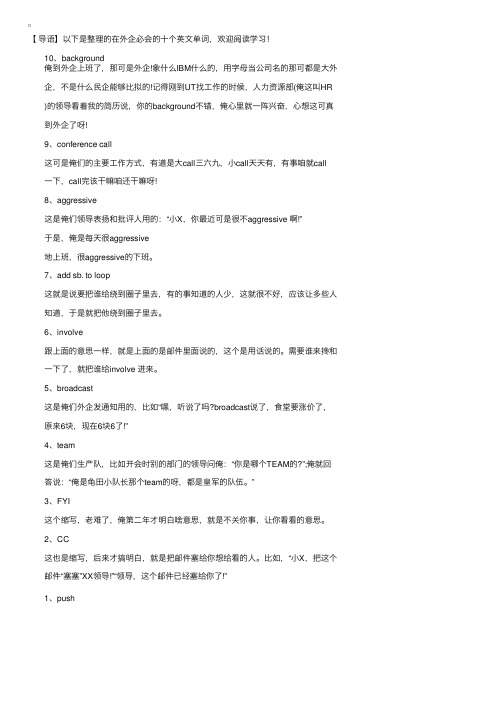
【导语】以下是整理的在外企必会的⼗个英⽂单词,欢迎阅读学习! 10、background 俺到外企上班了,那可是外企!象什么IBM什么的,⽤字母当公司名的那可都是⼤外 企,不是什么民企能够⽐拟的!记得刚到UT找⼯作的时候,⼈⼒资源部(俺这叫HR )的领导看着我的简历说,你的background不错,俺⼼⾥就⼀阵兴奋,⼼想这可真 到外企了呀! 9、conference call 这可是俺们的主要⼯作⽅式,有道是⼤call三六九,⼩call天天有,有事咱就call ⼀下,call完该⼲嘛咱还⼲嘛呀! 8、aggressive 这是俺们领导表扬和批评⼈⽤的:“⼩X,你最近可是很不aggressive 啊!” 于是,俺是每天很aggressive 地上班,很aggressive的下班。
7、add sb. to loop 这就是说要把谁给绕到圈⼦⾥去,有的事知道的⼈少,这就很不好,应该让多些⼈ 知道,于是就把他绕到圈⼦⾥去。
6、involve 跟上⾯的意思⼀样,就是上⾯的是邮件⾥⾯说的,这个是⽤话说的。
需要谁来搀和 ⼀下了,就把谁给involve 进来。
5、broadcast 这是俺们外企发通知⽤的,⽐如“嘿,听说了吗?broadcast说了,⾷堂要涨价了, 原来6块,现在6块6了!” 4、team 这是俺们⽣产队,⽐如开会时别的部门的领导问俺:“你是哪个TEAM的?”;俺就回 答说:“俺是龟⽥⼩队长那个team的呀,都是皇军的队伍。
” 3、FYI 这个缩写,⽼难了,俺第⼆年才明⽩啥意思,就是不关你事,让你看看的意思。
2、CC 这也是缩写,后来才搞明⽩,就是把邮件塞给你想给看的⼈。
⽐如,“⼩X,把这个 邮件“塞塞”XX领导!”“领导,这个邮件已经塞给你了!” 1、push。
超全外企常用英文
超全整理外企常用英文————————————————————————————————作者:————————————————————————————————日期:超全整理外企常用英文,收藏起来慢慢背!邮件中1. BTW: by the way 顺便问下,顺便提下2. FYI: for your information 供参考3. FYR: for your reference 供参考4. EOD: end of the day 下班前,比如说EOD Thursday,就是周四下班前5. ASAP: as soon as possible 尽快6. TBD, TBC: to be determined/decided/confirmed 待定,比如会议室TBD,就是说会议室还待定的意思7. OT: overtime 加班8. P.S: postscript 补充说明9. RSVP: 法语Répondez s'il vous plait, 希望得到回复的时候加上10. CC: carbon copy 抄送11. FW: forward 转发12. Re: reply 回复13. N/A: not applicable 表格中有时候不允许空值的话可以填这个14. Loop in / drop:写邮件,觉得与谁相关,就回复全部,加上loop in 谁谁,相当于@一样,drop的话也是觉得与谁无关,就回复全部说drop掉谁,把那个人移除邮件会话。
15. On annual leave/ business trip: 休年假,出差时往往也发封邮件给相关的同事告知。
16. OOTO: out of the office, 外出不在办公室。
17. AFAIK: as far as I know, 据我所知。
18. BR: best regards, 祝好。
超全整理外企常用英文,收藏起来慢慢背!开会时1. 1:1: 念作one on one,指的是一对一开会,有时口语也会随口说one one。
外企常用英语
外企常用英语外企(Foreign Enterprise)是指在我国境内以外国投资主体为主的企业。
外企的存在为我国带来了大量的外来文化和交流,同时也带来了很多跨国贸易机会。
在外企工作,掌握一些常用的英语表达是非常重要的。
本文将介绍外企中常用的一些英语表达。
1. Greetings and Introductions(问候和介绍)In an English-speaking work environment, it is important to know how to greet and introduce yourself to colleagues and clients. Here are some common phrases:- Good morning/afternoon/evening: 早上好/下午好/晚上好- How are you?: 你好吗?- Nice to meet you: 很高兴认识你- My name is ______: 我的名字是______2. Meetings(会议)Meetings are a common occurrence in foreign companies. Here are some phrases that can be used during meetings:- Could you please take a seat?: 请坐- Let's begin/start the meeting: 让我们开始会议- I have a few points to discuss: 我有几个要点要讨论- Can you elaborate on that?: 你能详细说明一下吗?3. Presentations(演示)Presentations are often used to share information and ideas in a professional setting. Here are some phrases that can be helpful during presentations:- Today, I would like to talk about...: 今天,我想谈谈...- Let me start by giving you some background information: 让我先介绍一下背景信息- As you can see on the screen: 正如你们在屏幕上看到的- Do you have any questions so far?: 到目前为止,你们有什么问题吗?4. Email Correspondence(邮件往来)Email is a common form of communication in foreign companies. Here are some useful phrases for writing professional emails:- Dear Mr./Ms. ______: 亲爱的______先生/女士- I am writing to inquire about...: 我写信是想了解...- Thank you for your prompt reply: 感谢您的及时回复- Please find attached the document you requested: 请查收您需要的文件5. Networking(社交)Networking is an important aspect of working in a foreign company. Here are some phrases that can be used during social interactions:- What do you do for a living?: 你从事什么职业?- Are you attending the conference next week?: 你下周会参加这个会议吗?- It was nice talking to you: 很高兴和你交谈- Let's stay in touch: 让我们保持联系6. Apologies and Requests(道歉和请求)Sometimes, it may be necessary to apologize or make a request in a professional setting. Here are some phrases that can be used:- I apologize for the inconvenience caused: 对给您带来的不便表示道歉- Could you please send me the report by tomorrow?: 你能否在明天之前将报告发给我?- I would appreciate it if you could help me with this matter: 如果您能帮我处理这个事情,我将不胜感激- Thank you for your assistance: 感谢您的帮助总结:以上是外企常用的一些英语表达。
外企面试英文词汇
hr、职业经理人常用的英文单词(非常实用)(1)目标 mission/ objective集体目标 group objective内部环境 internal environment外部环境 external environment计划 planning组织 organizing人事 staffing领导 leading控制 controlling步骤 process原理 principle方法 technique经理 manager总经理 general manager行政人员 administrator主管人员 supervisor企业 enterprise商业 business产业 industry公司 company效果 effectiveness效率 efficiency企业家 entrepreneur权利 power职权 authority职责 responsibility科学管理 scientific management现代经营管理 modern operational management行为科学 behavior science生产率 productivity激励 motivate动机 motive法律 law法规 regulation经济体系 economic system管理职能 managerial function产品 product服务 service利润 profit满意 satisfaction归属 affiliation尊敬 esteem自我实现 self-actualization人力投入 human input盈余 surplus收入 income成本 cost资本货物 capital goods机器 machinery设备 equipment建筑 building存货 inventory(2)经验法 the empirical approach人际行为法 the interpersonal behavior approach集体行为法 the group behavior approach协作社会系统法 the cooperative social systems approach 社会技术系统法 the social-technical systems approach 决策理论法 the decision theory approach数学法 the mathematical approach系统法 the systems approach随机制宜法 the contingency approach管理任务法 the managerial roles approach经营法 the operational approach人际关系 human relation心理学 psychology态度 attitude压力 pressure冲突 conflict招聘 recruit鉴定 appraisal选拔 select培训 train报酬 compensation授权 delegation of authority协调 coordinate业绩 performance考绩制度 merit system表现 behavior下级 subordinate偏差 deviation检验记录 inspection record误工记录 record of labor-hours lost 销售量 sales volume产品质量 quality of products先进技术 advanced technology顾客服务 customer service策略 strategy结构 structure(3)领先性 primacy普遍性 pervasiveness忧虑 fear忿恨 resentment士气 morale解雇 layoff批发 wholesale零售 retail程序 procedure规则 rule规划 program预算 budget共同作用 synergy大型联合企业 conglomerate资源 resource购买 acquisition增长目标 growth goal专利产品 proprietary product竞争对手 rival晋升 promotion管理决策 managerial decision商业道德 business ethics有竞争力的价格 competitive price供货商 supplier小贩 vendor利益冲突 conflict of interests派生政策 derivative policy开支帐户 expense account批准程序 approval procedure病假 sick leave休假 vacation工时 labor-hour机时 machine-hour资本支出 capital outlay现金流量 cash flow工资率 wage rate税收率 tax rate股息 dividend现金状况 cash position资金短缺 capital shortage总预算 overall budget资产负债表 balance sheet可行性 feasibility投入原则 the commitment principle 投资回报 return on investment生产能力 capacity to produce实际工作者 practitioner最终结果 end result业绩 performance个人利益 personal interest福利 welfare市场占有率 market share创新 innovation生产率 productivity利润率 profitability社会责任 public responsibility董事会 board of director组织规模 size of the organization 组织文化 organizational culture 目标管理 management by objectives 评价工具 appraisal tool激励方法 motivational techniques 控制手段 control device个人价值 personal worth优势 strength弱点 weakness机会 opportunity威胁 threat个人责任 personal responsibility顾问 counselor定量目标 quantitative objective定性目标 qualitative objective可考核目标 verifiable objective优先 priority工资表 payroll(4)策略 strategy政策 policy灵活性 discretion多种经营 diversification评估 assessment一致性 consistency应变策略 consistency strategy公共关系 public relation价值 value抱负 aspiration偏见 prejudice审查 review批准 approval主要决定 major decision分公司总经理 division general manager 资产组合距阵 portfolio matrix明星 star问号 question mark采购 procurement人口因素 demographic factor地理因素 geographic factor公司形象 company image产品系列 product line合资企业 joint venture破产政策 liquidation strategy紧缩政策 retrenchment strategy战术 tactics(5)追随 followership个性 individuality性格 personality安全 safety自主权 latitude悲观的 pessimistic静止的 static乐观的 optimistic动态的 dynamic灵活的 flexible抵制 resistance敌对 antagonism折中 eclectic(6)激励 motivation潜意识 subconscious地位 status情感 affection欲望 desire压力 pressure满足 satisfaction自我实现的需要 needs for self-actualization 尊敬的需要 esteem needs归属的需要 affiliation needs安全的需要 security needs生理的需要 physiological needs维持 maintenance保健 hygiene激励因素 motivator概率 probability强化理论 reinforcement theory反馈 feedback奖金 bonus股票期权 stock option劳资纠纷 labor dispute缺勤率 absenteeism人员流动 turnover奖励 reward(7)特许经营 franchise热诚 zeal信心 confidence鼓舞 inspire要素 ingredient忠诚 loyalty奉献 devotion作风 style品质 trait适应性 adaptability进取性 aggressiveness热情 enthusiasm毅力 persistence人际交往能力 interpersonal skills行政管理能力 administrative ability智力 intelligence专制式领导 autocratic leader民主式领导 democratic leader自由放任式领导 free-rein leader管理方格图 the managerial grid工作效率 work efficiency服从 obedience领导行为 leader behavior支持型领导 supportive leadership参与型领导 participative leadership指导型领导 instrumental leadership成就取向型领导 achievement-oriented leadership。
外企常用英语
外企常用英语
1、review 审查、检查。
2、deadline 截止日期。
3、agenda 议程。
4、feedback 反馈。
5、tough 困难的。
6、pipeline 渠道。
7、supporting 支持的。
8、budget 预算。
9、case 案例。
10、team 团队。
11、delay 延迟。
12、scope 范围。
13、budget 预算。
14、milestone 里程碑。
15、make sense 有道理。
16、schedule 时间表。
17、battle 战斗,根据语境会引申为争斗/争论。
18、ASAP 尽快。
19、comments 评论。
20、whatever 随便。
21、okay 好的。
22、challenge 挑战,公司语境下也会引申为质疑。
23、anyway 无论如何。
24、focus 专注。
25、performance 表现。
26、point 观点。
27、keep somebody posted 就某件关注的市项,让人随时知悉进展。
28、brainstorm 开动脑力,激起头脑风暴。
29、compromise 公司里有人,就有政治,就有妥协。
30、challenge 跟老板叫板,challenge the boss。
31、teamwork 团队精神。
32、NG 不好,再来一次。
33、FNG 菜鸟,新员工。
- 1、下载文档前请自行甄别文档内容的完整性,平台不提供额外的编辑、内容补充、找答案等附加服务。
- 2、"仅部分预览"的文档,不可在线预览部分如存在完整性等问题,可反馈申请退款(可完整预览的文档不适用该条件!)。
- 3、如文档侵犯您的权益,请联系客服反馈,我们会尽快为您处理(人工客服工作时间:9:00-18:30)。
批准approval
主要决定major decision
分公司总经理division general manager
资产组合距阵portfolio matrix
明星star
问号question mark
采购procurement
人口因素demographic factor
地理因素geographic factor
公司形象company image
产品系列product line
合资企业joint venture
破产政策liquidation strategy
紧缩政策retrenchment strategy
战术tactics
(5)
追随followership
个性individuality
性格personality
服从obedience
领导行为leader behavior
支持型领导supportive leadership
参与型领导participative leadership
指导型领导instrumental leadership
成就取向型领导achievement-oriented leadership
(4)
策略strategy
政策policy
灵活性discretion
多种经营diversification
评估assessment
一致性consLeabharlann stency应变策略consistency strategy
公共关系public relation
价值value
抱负aspiration
偏见prejudice
保健hygiene
激励因素motivator
概率probability
强化理论reinforcement theory
反馈feedback
奖金bonus
股票期权stock option
劳资纠纷labor dispute
缺勤率absenteeism
人员流动turnover
奖励reward
(7)
特许经营franchise
热诚zeal
信心confidence
鼓舞inspire
要素ingredient
忠诚loyalty
奉献devotion
作风style
品质trait
适应性adaptability
进取性aggressiveness
热情enthusiasm
毅力persistence
人际交往能力interpersonal skills
欲望desire
压力pressure
满足satisfaction
自我实现的需要needs for self-actualization
尊敬的需要esteem needs
归属的需要affiliation needs
安全的需要security needs
生理的需要physiological needs
维持maintenance
安全safety
自主权latitude
悲观的pessimistic
静止的static
乐观的optimistic
动态的dynamic
灵活的flexible
抵制resistance
敌对antagonism
折中eclectic
(6)
激励motivation
潜意识subconscious
地位status
情感affection
行政管理能力administrative ability
智力intelligence
专制式领导autocratic leader
民主式领导democratic leader
自由放任式领导free-rein leader
管理方格图the managerial grid
工作效率work efficiency
